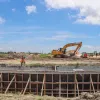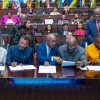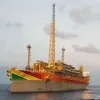infoguyana.caracas@mission.gov.gy | Working Hours: 8:30 am to 3:30 pm | tel:+58 424 1264347
2023 - The International Court of Justice rejects Venezuela's objections
2023 - Venezuela's concerns that the International Court of Justice is not the appropriate body to adjudicate on the boundary dispute over the oil-rich western region of Guyana have been rejected. The Court of Justice says it will now adjudicate the matter.
A recent referendum in Venezuela revealed that the majority of voters support the nation's claim to Essequibo and supported the creation of a new Venezuelan state there. In response to what it regards as Venezuela's "annexation" attempt, Guyana is pleading for regional and global assistance.
2022-2023: Submissions and Hearings
2022: Both nations submitted detailed arguments to the ICJ. Venezuelan Foreign Minister Yván Gil reiterated Venezuela’s stance that the 1899 Arbitral Award was invalid, while Guyanese Foreign Minister Hugh Todd continued to defend the award's legitimacy.
2021: ICJ Ruling on Jurisdiction
On December 18, 2020, the ICJ ruled in favor of hearing the case, a decision lauded by Guyanese Foreign Minister Hugh Todd as "an important step towards a definitive resolution." Venezuelan Foreign Minister Jorge Arreaza criticized the ruling, stating, "This is a setback for bilateral diplomacy and a violation of the spirit of the Geneva Agreement."
2020 - Guyana and Suriname strengthens ties
2020 - While a commission examines the New River Triangle territory between the two countries—a boundary dispute that dates back to the 19th century—Presidents Ali of Guyana and Santokhi of Suriname affirm the two nations' intention to forward with economic cooperation and development.
2019 - Drilling begins at major offshore oil deposits
2019 - Drilling begins at major offshore oil deposits identified by ExxonMobil.
2018: ICJ Proceedings
In 2018, the ICJ confirmed its jurisdiction over the case. Venezuelan Foreign Minister Jorge Arreaza maintained Venezuela's opposition, stating, "We stand firm in our belief that this dispute must be resolved through direct negotiations, not imposed rulings." Guyanese Foreign Minister Carl Greenidge welcomed the ICJ's decision, calling it "a victory for international law and the rule of justice."
2015: Guyana's multiracial opposition coalition led by David Granger wins the general election, ExxonMobil discovers oil
2015 - Guyana's multiracial opposition coalition led by David Granger wins the general election, ending 23 years of rule by the Indo-Guyanese PPP party. The PPP returns to power five years later.
2013: The ICJ Involvement
Guyanese Foreign Minister Carolyn Rodrigues-Birkett filed an application with the International Court of Justice (ICJ) in 2013, arguing that the court should validate the 1899 Arbitral Award. Venezuelan Foreign Minister Elías Jaua responded, insisting that "the ICJ lacks jurisdiction, as the Geneva Agreement mandates bilateral negotiations, not judicial intervention."
1999-2010: Diplomatic Efforts and Regional Tensions
1999: Venezuelan President Hugo Chávez and Foreign Minister José Vicente Rangel sought to strengthen regional ties while keeping the dispute at a diplomatic level. Chávez frequently mentioned, "The Esequibo is ours, but we seek a peaceful resolution through dialogue and understanding."
2010: When Guyana awarded oil exploration licenses in the disputed maritime zone, Venezuelan Foreign Minister Nicolás Maduro condemned the move, stating, "Guyana's actions undermine the spirit of the Geneva Agreement and threaten regional peace."



